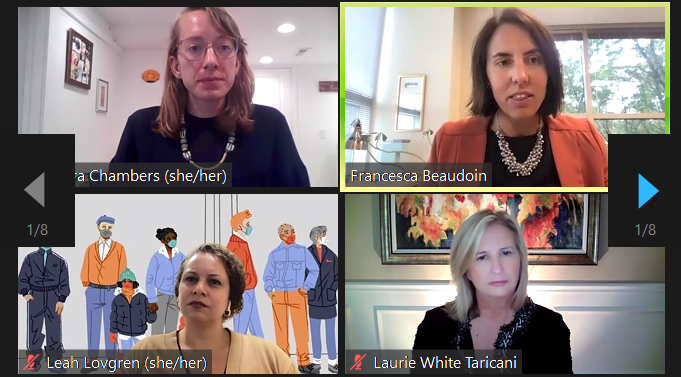
PROVIDENCE – According to a U.S. Census Bureau survey, 7.6% of all U.S. adults are currently experiencing symptoms of long COVID, the name commonly given to a broad set of new or persistent symptoms present at least one to three months after a COVID-19 infection without another apparent cause.
Nearly all Rhode Island employers, at 90%, report at least some familiarity with the term long COVID, according to a survey by the Greater Providence Chamber of Commerce. But only 15% say they have accommodations for employees with long COVID in place.
To educate employers on the condition and resulting workplace impacts, the Brown University-based Long Covid Initiative on Wednesday held a presentation titled “Long Covid and the Workplace,” prepared for the Greater Providence Chamber of Commerce.
Even for leading researchers, many aspects of long COVID, including its cause, remain murky. But what is clear, the panelists said, is that the condition is known to impact nearly 20 million U.S. adults, with an estimated 7.6% of all American adults currently living with long COVID, according to a U.S. Census Bureau survey.
“Everyone on this call today knows somebody, whether you’re aware of it or not, that has long COVID, probably both in your personal life and very likely in your place of business,” said Dr. Francesca Beaudoin, faculty director of the Long Covid Initiative and interim chairman of the Brown Department of Epidemiology.
“This is something that was not on our radar in the early days of the pandemic, but pretty soon thereafter emerged as a true public health problem,” she continued.
Launched in September 2021 out of the People, Place and Health Collective, the Long COVID Initiative studies the post-COVID illness, works to raise awareness and makes policy recommendations.
More than 200 symptoms are associated with long COVID, said Laura Chambers, lead research scientist at PPHC and founder of the Long Covid Initiative, though some of the most common include fatigue, shortness of breath, cognitive dysfunction, depression and chest pain.
For some, those symptoms are debilitating in the workplace and other aspects of everyday life.
Around 40% to 60% of people with long COVID are reducing their work hours, Beaudoin said, and at any given time, 3 to 4 million people cannot work due to long COVID. People who have labor-intensive jobs or an inability to work remotely are disproportionately impacted, she added.
“If roughly 5 to 8% of the U.S. population is walking around with long COVID, and then a subset of those people are having significant functional impacts, that’s clearly going to translate to areas of work, schools, taking care of children or parents who have long COVID,” Beaudoin said. “so it’s not surprising to see some of these estimates that (long COVID) causes lost wages of around 170 billion, likely more.”
Those unable to work may also experience added difficulty attaining disability benefits, Beaudoin said.
While long COVID is recognized as a disability under the Americans with Disabilities Act as of July 2021, some have difficulty claiming benefits due to challenges such as no diagnostic test existing for long COVID, or no documentation of an initial COVID-19 infection, she added.
Other factors, such as insurance limits on payments for self-reported conditions and the phasing-out of pandemic-era programs such as supplemental income and rent assistance also pose additional financial difficulties for employees and employers.
While studies suggest long COVID is less prevalent with new variants, Beaudoin said, “this problem, unfortunately, is not going away.”
Even those with mild or asymptomatic COVID-19 can develop the condition, Chambers said, but data suggest long COVID is more common in those who had a severe initial illness, were not vaccinated, have certain health conditions, are older adults or women.
Some patients fully recover from long COVID eventually, but others still have symptoms from infections in the early days of the pandemic.
“There is a lot of clinical research being developed on long COVID, but there’s still little evidence on how long it will impact the workplace, economy and our healthcare systems,” said Leah Lovgren, program manager at the Long Covid Initiative.
The Long Covid Initiative will continue to study workplace impacts, and in the next month, intends to survey 5,000 Rhode Island employers on how long COVID impacts their workplace, benefits, accommodations and overall response to the COVID-19 pandemic.
Jacquelyn Voghel is a PBN staff writer. You may reach her at Voghel@PBN.com.












